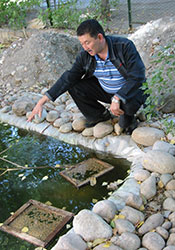Malaria elimination

WHO
A turning point to malaria elimination: the Tashkent Declaration
For the first time in 2015, the WHO European Region reported zero indigenous malaria cases, meeting the goal of the 2005 Tashkent Declaration to eliminate malaria in the Region by 2015.
In 2005, new cases of malaria were at a level such that the goal of interruption of transmission had become feasible.
Therefore, ministers of health of the malaria-affected countries – Armenia, Azerbaijan, Georgia, Kazakhstan, Kyrgyzstan, the Russian Federation, Tajikistan, Turkey, Turkmenistan and Uzbekistan – signed the Tashkent Declaration in support of this goal.
The Declaration led to a new regional strategy 2006–2015 that guided affected countries in the Region to reduce indigenous malaria cases to zero.
Factors leading to elimination
The elimination effort in the Region was made possible through:
- high-level political commitment
- intense programmatic efforts in affected countries
- WHO technical support and financial assistance.
Key elements were:
- heightened detection and surveillance of malaria cases
- integrated strategies for mosquito control with community involvement
- cross-border collaboration
- information to people at risk.
How a country is certified malaria free
Certification of malaria elimination is the official recognition of malaria-free status granted by WHO. When a country has zero locally acquired malaria cases for at least 3 consecutive years, it can request WHO to certify its malaria-free status.
Certification confirms that the country, at that point in time, has halted local transmission by Anopheles mosquitoes and that it has created an adequate system for preventing its re-establishment. The final decision to grant certification is made by the WHO Director-General for a country as a whole and for all 4 human malaria species.
Countries request certification to gain international recognition of their achievement for economic reasons, such as foreign investment, tourism, etc. Certification is not required. The country and WHO jointly bear the cost of the process. Countries are expected to continue reporting on an annual basis to WHO on the maintenance of their malaria-free status.



